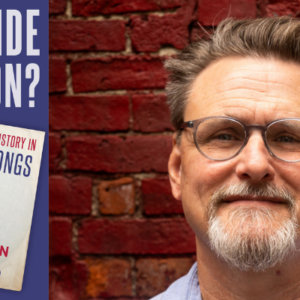
The Bardo of Widowhood: Considering Kathryn Davis’s Meditations on Grief
Howard Norman Reads Aurelia, Aurélia
In Kathryn Davis’ new memoir Aurelia, Aurélia life becomes more precious, language more urgent, and grief strikes deep chords. Davis’ husband Eric, an “ecological economist,” died of cancer in 2019, and throughout Aurelia, Aurélia where there is not outright elegy there is elegiac anticipation. Though all of l08 pages in length, the narrative—not strictly chronological—arcs all the way from Davis’ childhood up to her present-day widowhood, and what is even more remarkable is that its emotional dimensions are symphonic. To be sure—must be called a memoir, but in essence it can only be fit into a much loftier category of literary regard: a work of great originality.
The overall experience of reading Aurelia, Aurélia corresponded to what I feel about the almost spectral compositions of Erik Satie, which is that he creates startlingly pitched vignettes of melancholy, which we can fully receive into the soul, but we should never think that we can feel what Satie felt in order to compose them. That is, in her memoir Davis gives us an astonishing amount, but a certain necessary and impenetrable privacy remains.
Davis’ memoir is structured so that its dozens and dozens of vignettes may be experienced as intersecting facets of meditative reminiscence. Still, there are certain refrains, themes, preoccupations. Grief, marriage, fairy tales, the Bardo,dreams. And perhaps most deeply informing, is literature itself. In fact, the memoir contains a kind of history of Davis’ formative reading life, inaugurated by The Alexandria Quartet by Lawrence Durrell, and To The Lighthouse by Virginia Woolf. “I didn’t just want to write like Virginia Woolf,” Davis writes, “I wanted to be Virginia Woolf.”
In Beethoven Was One Sixteenth Black, Nadine Gordimer, referring to the loss of her own husband, writes, “Grief is boring after a while, burdensome even to close confidants.” But then again Gordimer was thinking about the numbing redundancy of grief, its insisting itself into even casual conversation, its anesthetizing depression. In a sense, the opposite is true in Aurelia, Aurélia. This may be obtuse (for which I apologize) but I am grateful that Davis felt grief so intensely, so that, in a kind of contrapuntal way, it allowed grief to rather stunningly enliven her narrative imagination—and besides, to my reading, what is on much higher exhibit in her memoir is the episodic portrait of a marriage. It’s joys and sorrows, its exasperations, its jousting certitudes, its civilities, its blind faith.
Speaking of marriage, Aurelia, Aurélia has something of what Robert Louis Stevenson called the humorously agitated charm of dire circumstance. There is a chapter, an extended anecdote—a kind of travelogue, really—titled “The Haunted Tent.” It is about a camping trip Davis made with her husband and their daughter in Nova Scotia. Now is a good time to mention that in her novels, Davis is nothing if not well-versed in spectral provocations—in fact, she has an erudition about both the folkloric and more modern belief in the phenomenon of ghosts that I think is matched only perhaps by Willa Cather’s. Davis can be almost convincing that the entire world is in a preternatural condition. Always has been. Always will be. Anyway, the title “The Haunted Tent is already tantalizing. We know something arresting may likely soon materialize.
I think of the Jewish proverb: If you want to make God laugh, make plans.
Davis expertly threads all the disparate elements of the memoir together, and finally paints it all with a brushstroke of poignant self-recognition.
So, the chapter begins with setting the scene, and practical instruction: “You make a long pole by fitting together several short poles that are connected inside by a single strand of elastic.” But quite soon nature asserts itself—and isn’t this absurdly familiar?—a kind of slapstick of haplessness.
Think of a reel of Buster Keaton or Charlie Chaplin, where small things might lead to big damages:
Meanwhile at Meat Cove tent life wasn’t going well I was fighting the wind to get the camp stove going; my husband was trying to make a campfire. Our daughter had returned with the water and was hungry. We had arrived later than planned due to a delayed ferry crossing. Okay, I said. Let me see if I can get this thing to work. A sign told us we needed to lock our food in the car because of bears. Meat Cove. Meat Cove. The wood they sold at the camp store had been cut from saplings, my husband said. I wouldn’t believe the disgusting crap the slobs who’d had our site before us left in the firepit. It was the bears, said our daughter. No, I said, the propane tank is almost empty. Did you hear what I said? My husband kicked the side of the firepit. Why do you start every sentence with “no”? Have you seen the bug spray? I asked. I never listened; that was the whole problem with me. Our daughter needed to pee. A car filled with young people pulled into the site next to ours, the radio turned up all the way. Here I go again on my own, goin’ down the only road I’ve ever known . . .At some point we must have eaten something resembling dinner, after which the three of us sat around the picnic table swatting mosquitoes. Then our daughter went to bed and the mosquitoes left and we lit the propane lamp and the moths arrived. Whiskey and cigarettes and gin rummy—it was like throwing gasoline on a fire. The tent just sat there, too, taking it in. Physical bodies do that. Then it began to rain.
That’s the thing about camping; if you want to get away, there’s nowhere to go. The fly had come loose and was flapping against the tent. A tent isn’t like an old house with a history; a ghost can’t just rise up out of nothing. I wish I was dead, I said. I tried to say it softly so as not to wake our daughter. Then the angry ghost came out of me and joined the angry ghost of my husband. Where his head emerged from the top of his sleeping bag I could see his eyeballs shining, meaning he was awake.
Cringe-worthy and lightly spiced with acerbic humor as this sequence is, it must be said that the whole of the “The Haunted Tent” chapter is, with a kind of diary-like intimacy, a deeply affecting and lovely treatise on mortality.
*
Fifteen or so years ago in San Francisco I attended a lecture on the Bardo by Pema Chödrön. The next day, sunlight glinting off the ocean, sandpipers scurrying along the margin between land and sea, I saw Pema Chödrön sitting on a beach. This was in the Point Reyes National Seashore in northern California. She had set out a blanket. Farther down the beach, three saffron-orange robed monks, possibly Chödrön’s companions, stood staring at a decomposing dolphin carcass festooned in kelp. Farther yet down the beach, a dozen basking sea lions.
A certain uncanny sensation washed over me, and I felt that I was experiencing a kind of tableau vivant of sentient beings, and the word that flew into my head was afterlife, and I was pretty sure I’d never see anything like it again. I suppose I thought of this because in Aurelia, Aurélia the Buddhist concept of the Bardo has all sorts of significance. Davis writes:
The wild leap that Beethoven makes from sweetness to discord at the end of Opus 134. And there you are, ghostly you and the ghostly artist, in ghostly communication in that non-existent place between words, images, notes.
A Buddhist calls this period of transition a lifetime, the great transition between birth and death.
Today, just now, checking my own diary and the notes on her lecture, I see that Pema Chödrön repeated a basic tenet that she often repeated and even wrote in a book: “Every state between birth and death offers the opportunity for transformation. Death isn’t just something that happens at the end. Life is continually arising, dwelling, ceasing, arising. This goes on forever.” Thus Aurelia, Aurélia is a Bardo we can read; thus the marriage was a Bardo we can laugh and weep in; thus the camping trip was a Bardo located in the Canadian Maritimes; Kathryn Davis’ dreams were Bardos; her husband’s death sends him into the Bardo; widowhood is a Bardo.
The virtuoso writing in Aurelia, Aurélia is a reprieve from all ghastly things.
And on pages 31 and 32 of Aurelia, Aurélia one finds this disquisition which, in modern day lingo, might be titled “What goes around comes around”:
In the bardo, narrative seems to happen but doesn’t. You think you are making a tuna sandwich. You think you are cutting the tuna sandwich into little squares to tempt your dying husband’s appetite. We’re born into the life bardo, and when we begin to die we’re in the death bardo, at which point we make our transition back via rebirth into the birth bardo, having experienced delight in the meeting between sperm and ovum and from that state of bliss fainting into unconsciousness and, as time passes, coming to maturity in the womb until finally, emerging from the womb and opening our eyes, we will have turned into a puppy or something and are back once again in the life bardo.
Some passages in Aurelia, Aurélia have what Marina Tsvetaeva called a strange unbridled pathos:
When someone you have lived with for a very long time dies, memory stops working its regular way—it goes crazy. It is no longer like remembering; it is, more often, like astral projection. “Like darkness in the movies, it tests the outline of your astral footprint,” my subconscious mind informed me the other night, speaking from beyond the bedroom wall, whereas the great memoirist Chateaubriand, speaking from beyond the grave, observed sourly that memory is often a quality associated with stupidity.
*
Aurelia, Aurélia. Who would not be curious about the title? With its lyrical echo. We are informed about the origin of the title in the very last chapter of the memoir. First: “When I was a pretentious girl of sixteen, with a prancing intellect and an overweening desire for Romance, I sailed to Europe on the student ship Aurelia. To cross an ocean is of course a form of transition, a crossing.”
Next: “Romantic obsession taken to the point of madness is the subject—maybe more specifically the landscape—of Gerard de Nerval’s novella Aurelia, written not long after the author was released from the sanatorium in Passay.”
And after several more passages, including a precise and interesting history of the ship Aurelia itself, Davis expertly threads all the disparate elements of the memoir together, and finally paints it all with a brushstroke of poignant self-recognition: “When I was a sixteen-year-old girl riding the Aurelia to Europe, my husband was a nine-year-old boy with fifty seven years left in which to do all the things he ended up doing in his life. The course of the transit is impossible to fathom, except via the remarkable apparatus of association. Even the North Atlantic has its limits. From Pier 84 in New York City to the great port of Le Havre. Whatever I was pretending to be that week on the ship is exactly what I was, the implausible outward trappings of the infinitely smaller thing inside.”
Every inimitable story must leave in the mind of the reader an intangible residuum of pleasure, even unsettling pleasure, or haunting pleasure; such a story has to have joy and sadness that at times may seem the same thing; it has to have, to paraphrase an idyll of Theocritus, shades of light and darkness moving over a field. Davis’ memoir has all of the above. The virtuoso writing in Aurelia, Aurélia is a reprieve from all ghastly things.
Howard Norman
Howard Norman has completed a memoir about friendship, The Wound Is The Place The Light Enters You. He was awarded The Lannan Award in Literature.



















